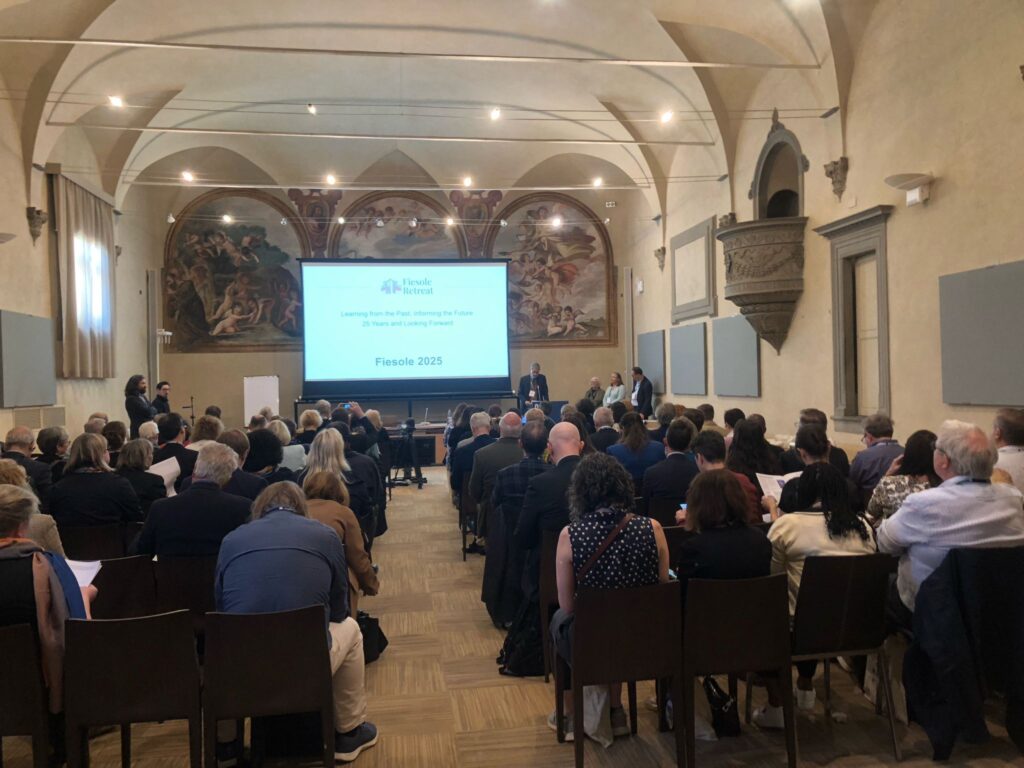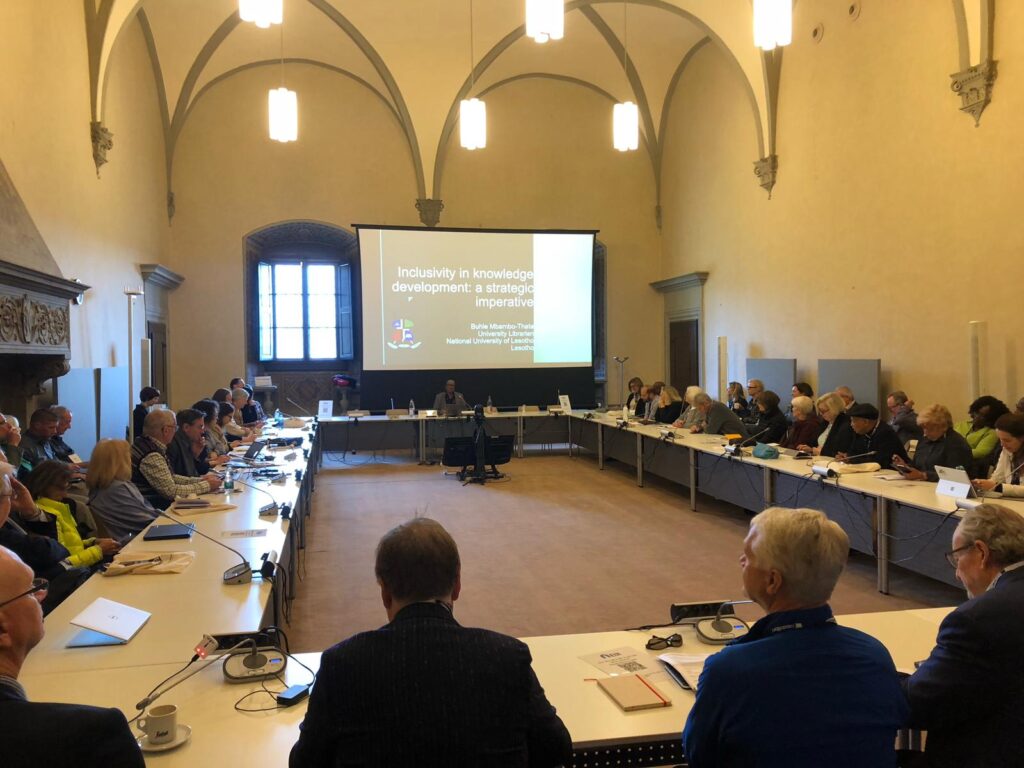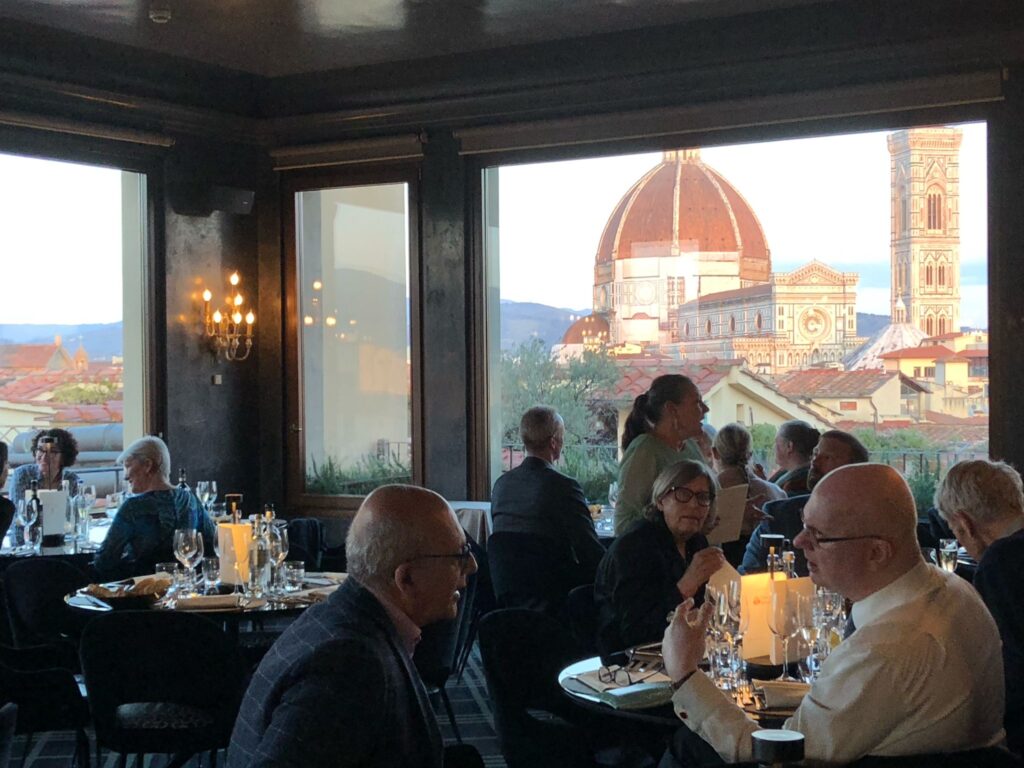Fiesole Collection Development Retreat 2025
On 7-9 April 2025, Casalini Libri and Charleston Hub celebrated the 25th anniversary edition of the Fiesole Collection Development Retreat, welcoming to Fiesole around 100 publishers, librarians and vendors for three days of reflection and conversation on the past, present and future challenges facing of libraries, collections, and the scholarly information chain as a whole.
This is a guest post from LIBER sponsor Casalini Libri, written by Helen Byrne, Casalini Libri Events Team.
An informal meeting of leading library and information professionals, the Fiesole Retreat is rooted in a desire to stimulate dialogue and collaboration across the scholarly communication sector and once a year brings together colleagues from all areas of the industry to view and consider the sector from a diverse range of perspectives. This year’s meeting was hosted by Casalini Libri’s near neighbour, the European University Institute, in liaison with the Council on Library and Information Resources (CLIR).
Reflecting the milestone anniversary, the theme of the 2025 meeting was “Learning from the Past; Informing the Future – 25 years and looking forward”.
Participation in the conference spanned long-time contributors and champions of the Retreat from the very first edition, returning colleagues and many first-time attendees, all representing a wide variety of institutions, contexts and geographical areas. The organisers and conveners provided thought-provoking and far-reaching sessions, across themes that were historically valid, recurring and still highly topical.

The two-and-a-half-day programme opened with a preconference session organised and moderated by host Librarian Pep Torn, Director of the EUI Library, dedicated to the topic of AI and Libraries, which looked into the potential and impact of AI in areas such as information literacy and copyright, as well as in the management of spaces, on library processes and for institutional repositories. Bringing fascinating examples of ways AI is already being used to streamline and facilitate processes, to experiences of and plans for the teaching of and support for AI literacy among undergraduate and graduate students, as well as how generative AI can enhance creativity and sharing of experiences among students from diverse cultures, the session sparked a lively discussion around the need for transparency and regulation as usage of AI extends across domains.

Following a brief welcome from co-organisers Michele Casalini, Rebecca Lenzini, and Leah Hinds, Pep Torn officially opened the conference before a personal account of the Fiesole Retreat series from Michael Keller (Stanford University Librarian, Vice Provost and Director of Academic Information Resources). The opening keynote from Richard Gallagher, President & Editor-in-Chief of Annual Reviews, on the subject of using academic publishing to empower society, which posed the question, “Can we lower the knowledge barrier?”, proposed and illustrated ways in which academic content can be made more engaging, relevant, and approachable, while maintaining standards and sustainability.
“Biodiversity at the Margins” was the first theme in the spotlight, exploring areas of productive tension and opportunities for innovation and addressing the challenges of community engagement, consistent workflows and predictable user experiences. A video message from Charles Watkinson (Associate University Librarian for Publishing at University of Michigan and Director of University of Michigan Press) introduced the panel, which was convened in person by Carol Mandel (Dean Emerita, New York University Libraries) and offered insight into the need to make digital humanities more mainstream, to recognise and support new and non-linear ways of creating knowledge, and to preserve, disseminate and sustain knowledge in ways that are not only traditional and institutional, but fair and accessible to the communities to whom it belongs.
The second day of the conference began with a look “Through the lens of the Humanities“, asking “What are the humanities today and who are they for?” with convener Ann Okerson (Director, Offline Internet Consortium). Speakers dealt with fundamental aspects for progress, as they described the “quiet revolution” that characterises progress in humanities scholarship and teaching in the face of falling faculty numbers and cuts in funding; the ever-important role of libraries as gatekeepers and gateways of knowledge for societies of the 21st century; and the importance and challenges of finding a balance between the enduring responsibility to preserve historic collections and contemporary needs for openness, accessibility and research.
The afternoon was dedicated to “The Broad Topic of Metrics”, split into two interconnected sessions, curated respectively by Julien Roche (LIBER President and Director of the Libraries, University of Lille) and Charles Henry (President of CLIR), which focused first on measurement and monitoring in the digital age, looking at opportunities to use indicators and decision-making tools to help university management to steer their institution and to help publishers to design services tailored to the needs of their customers and users, before delving into the perverse arithmetic of prestige, in which contributors from publishing and libraries addressed incentives and constraints in the search for innovative solutions to historical and persisting challenges.

Central to the final day of the conference was the theme of inclusivity, continuing and cultivating the conversation which had begun in Cape Town the previous year. Buhle Mbambo-Thata, University Librarian at National University of Lesotho, set the tone for proceedings with her enlightening and though-provoking keynote, delving into questions of partnership, access, bias and infrastructure and advocating collaboration and community for the creation of a true global knowledge system. Led by Giannis Tsakonas (LIBER Vice-President, Director, Library & Information Centre, University of Patras), the final session of the conference looked at “Equitable Partnerships for an Equitable World of Knowledge”, discussing existing initiatives that aim to create a better environment for collaboration and underlining the principles, attitudes and practices that are required to build the context of balanced participation and beneficial partnership for all.
Bringing the conference to a close, David Worlock (Chief Research Fellow, Outsell) remarked on the inclusivity of the Retreat itself, affirmed the importance both of connecting knowledge and ideas – from the prolific letter-writing of Samuel Hartlib to maintaining and improving connectivity as times, communications and roles change – and of embracing new ideas, with libraries central to maintaining and monitoring knowledge in the new and evolving landscape of scholarly publishing.
Over the three richly informative – and gloriously sunny – days, participants had the opportunity to look back over 25 years of development and dialogue and forge collective foundations to go forwards in partnership, working together towards more widespread, open and inclusive access to cultural heritage and knowledge.

Presentation slides are available on the Fiesole Retreat website at https://www.fiesoleretreat.org/fiesole_2025#speeches; reflections on the conference from participants Michael Upshall and David Worlock can be viewed at https://www.fiesoleretreat.org/fiesole_2025#press.
Recent News